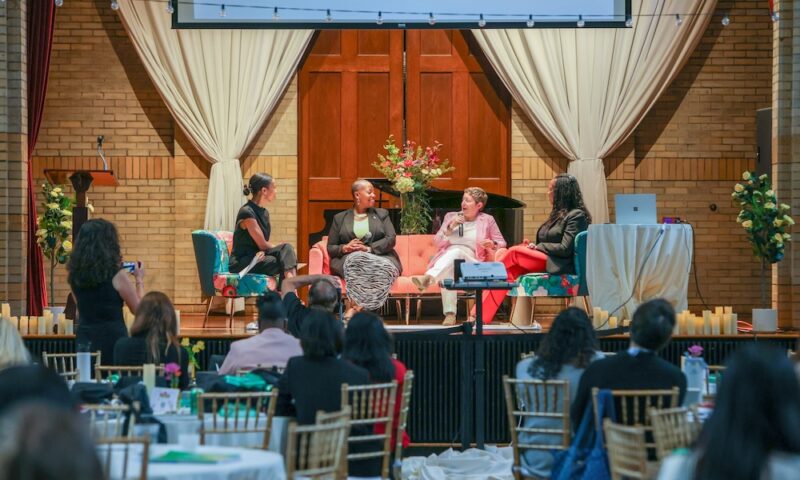
Leading With Courage: Lessons From “The Exchange: A Women’s Leadership Experience”
Explore takeaways from ASAE’s women’s leadership event focused on resilience, authenticity, and leading with strength and purpose.
In an era where authenticity and vulnerability are being recognized as strengths in leadership, ASAE’s June 2025 day-long gathering, “The Exchange: A Women’s Leadership Experience,” offered a powerful reminder that courage, mental resilience, and self-preservation are critical tools for all association women leaders and those aspiring to be.
In a world of constant change, women leaders are finding strength in vulnerability, clarity in purpose, and power in community.
As association leaders grapple with economic uncertainty, generational shifts in the workforce, and an increasingly steep “glass cliff,” women executives find themselves often navigating these headwinds while also confronting persistent gender expectations combined with burnout risks. The post-pandemic era has magnified the pressures placed on leadership, especially for women, who are more likely to be sought after as both leaders and emotional anchors for their teams, while managing change, innovation, and the push for relevance.
For many, the challenges are both structural and cultural: tightening budgets, rapidly changing economic environments and resulting member needs, and the increasing requirement to lead both in-person and remote teams with agility. But the deeper challenge is more personal—how do women leaders stay grounded, connected, and inspired when the pace of change feels relentless and the stakes are high?
That question was at the heart of “The Exchange: A Women’s Leadership Experience,” an event that’s designed to spark honest dialogue, teach key tools for building resilience, and redefine leadership on women’s terms. The event brought together association executives from across the country for a day of storytelling and sharing, reflection, and insight—rooted in real-life experiences, not leadership theory.
Here are three powerful takeaways:
1. Lead with vulnerability and authenticity.
Opening keynote speaker Michelle Poler, founder of the “100 Days Without Fear” project, flipped the script on traditional leadership by urging us to acknowledge our fears so that we can be brave versus fearless.
Poler’s viral journey of confronting 100 personal fears (ranging from singing on stage with a large audience and dancing in Times Square to giving her first Tedx Talk) illustrated how showing up despite your fear can create meaningful and authentic leadership impact.
Her story challenged attendees to stop living according to society’s checklist and instead define success on their own terms. “You can’t visualize your dream life and then live by someone else’s standards,” she said. Instead of asking, “What’s the worst that could happen?” Poler recommends reframing our internal dialogue: “What’s the best thing that could happen?”
2. Lead with your strongest muscle—your mind.
Executive coach Amy Yip challenged attendees to think differently about how they handle stress, setbacks, and uncertainty. Using the Positive Intelligence® framework, she emphasized that mental fitness—our ability to respond to life’s challenges with a positive rather than negative mindset—isn’t innate, but trainable.
Yip likened the process to Jedi training: “Your strongest muscle and worst enemy is your mind—train it well.” Through daily “PQ reps” (mental exercises that boost presence and self-command), leaders can rewire their default reactions to stress and setbacks. Her message was clear: Mental fitness isn’t optional—it’s the foundation of peak performance and personal fulfillment.
Yip introduced attendees to the voices in our heads: the “Saboteurs,” which judge and react based on fear, and the “Sage,” which brings curiosity, empathy, and possibility. Learning to strengthen the Sage and quiet the Saboteurs, she explained, requires daily mental “reps”—short exercises to build emotional regulation and resilience.
To illustrate the power of perspective, Yip shared a version of the classic Chinese farmer parable that focuses on how outcomes in life can be both good and bad. The parable offers a striking metaphor for leadership in times of volatility. As Yip noted, the difference between reacting from fear and responding with wisdom often comes down to which voice we strengthen. “Mental fitness means being able to pause, assess, and choose a wiser path,” she said. It’s not about avoiding challenge—it’s about meeting it with clarity and intention.
In a time when so much feels uncertain, this mindset shift may be one of the most essential tools in any leader’s arsenal.
3. Lead from strength not burnout.
During the “ElevateHER™ Talks” and panel on self-preservation, speakers, including Lakisha Ann Woods, Mariama Boney, and Elena Gerstmann, reminded attendees of an often-overlooked truth: Leaders must protect their own energy in order to lead effectively. Whether it’s saying no to burnout culture, setting clearer boundaries, or choosing joy as a strategic focus, the conversation was a powerful call to recalibrate.
Two particularly resonant lines: “Never stay in a job when you have more baggage than you can carry.” And, “Don’t let someone live rent-free in your brain.”
The Exchange gave women leaders permission to be bold, be human, and most importantly, be themselves. And in a world that often demands perfection, that may be the bravest act of all.
[Photos by EPNAC for ASAE]






Comments